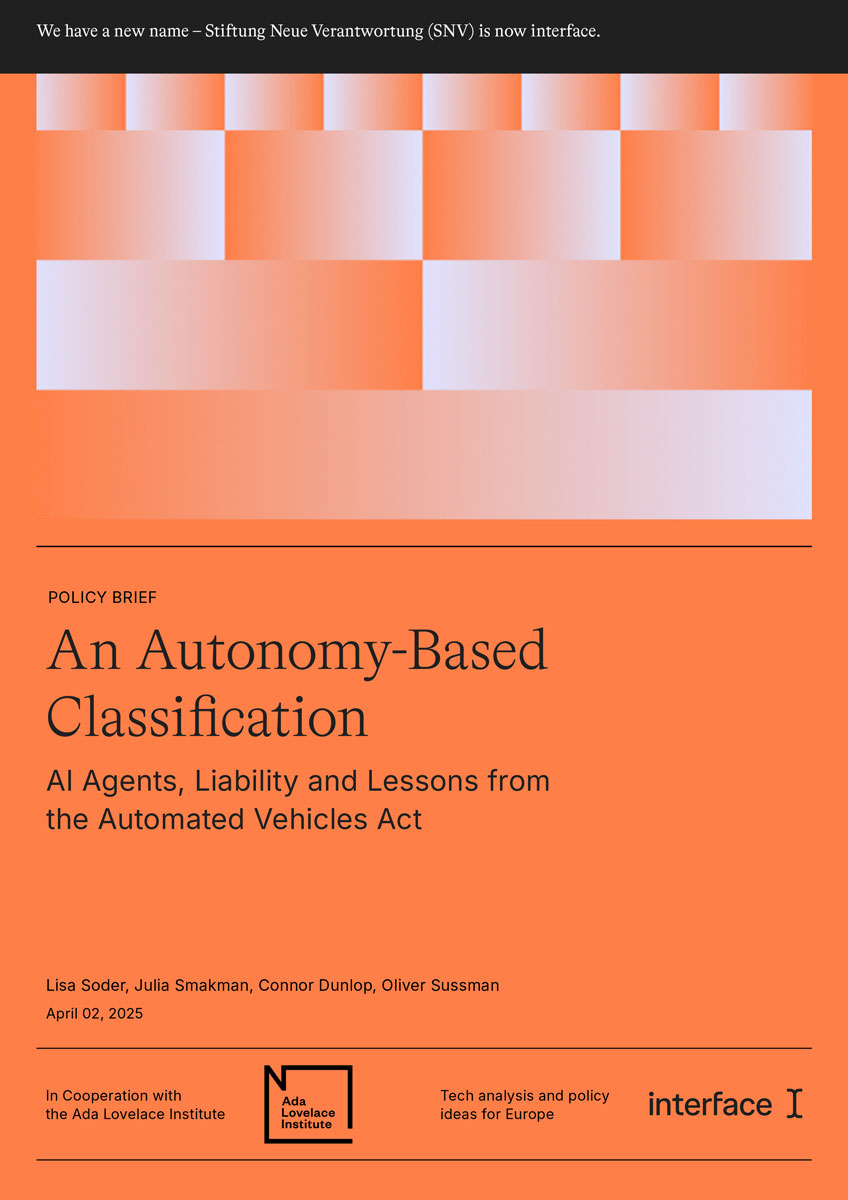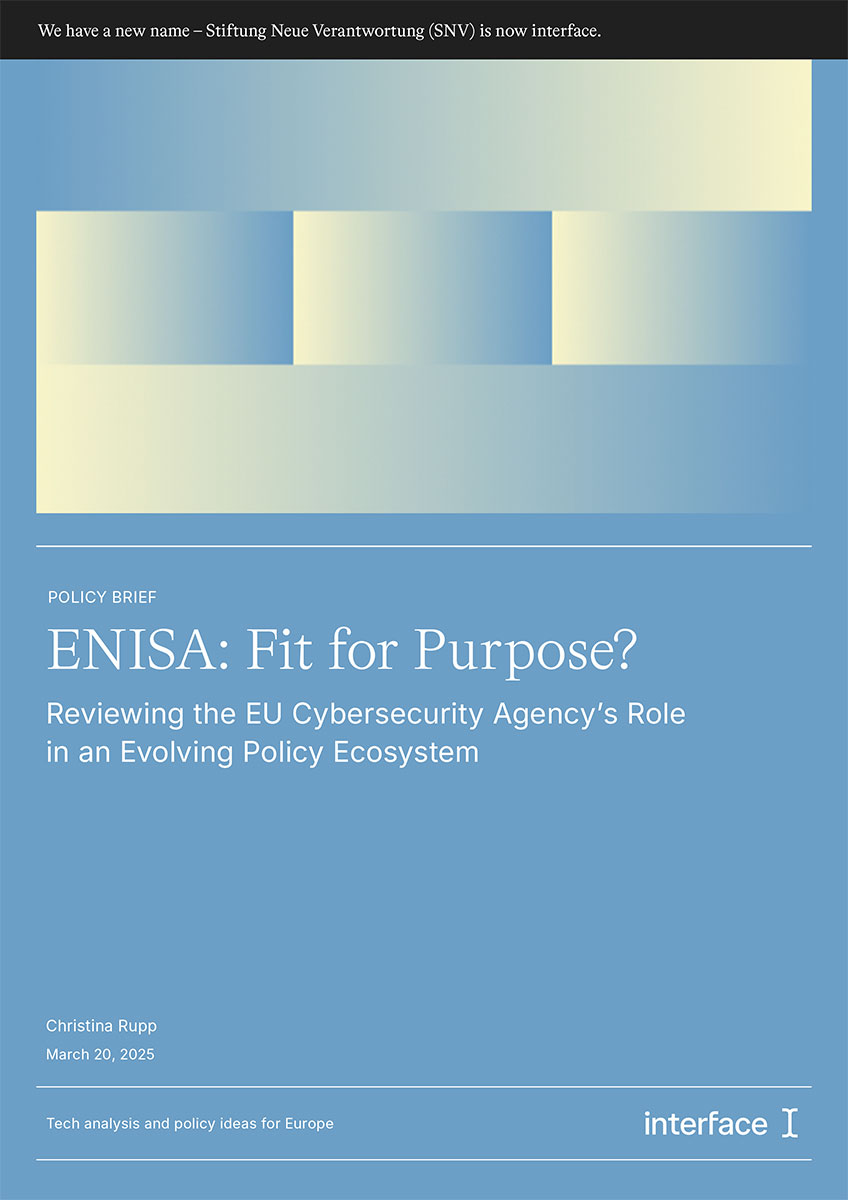Newsletter
Some Tech News to Start Your Spring
Published
April 09, 2025
Dear reader,
We are back in your inbox again, ready to start this Spring with a fresh batch of news and research. But before we give you an overview of our latest papers, projects and events, we wanted to tell you about a big update: We are moving! From June onwards, interface's new headquarters will be based at Publix, in one of Berlin's most lively neighbourhoods in Neukölln.
Publix is a collaborative co-working space that brings together journalists, media professionals, and non-profit organizations working in the public interest. We are moving to this dynamic place to better accommodate the digital work streams of our team, and to further strengthen our relationship with professionals and organisations working hard to promote civil society, democracy and accountability in Europe. If you are ever in the neighbourhood, don't hesitate to reach out!
We wish you a pleasant reading,
Ernesto Oyarbide-Magaña
(Lead PR & Outreach)
Luisa Seeling
(Lead Writing, Editing & Publishing)
and the entire interface team
Our latest Publications
An autonomy-based classification: AI agents, liability and lessons from the Automated Vehicles Act
by Lisa Soder et al.
Despite the EU’s recent decision to shelve its AI Liability Directive, the question of who bears responsibility when AI causes harm is far from settled. This issue looms particularly large with the rise of AI agents—autonomous systems that move beyond traditional chatbots to perform complex, real-world tasks with minimal human oversight. In this paper, our AI expert Lisa Soder teams up with researchers from the Ada Lovelace Institute to examine the defining features of AI agents, explain the liability challenges they introduce, and propose an autonomy-based taxonomy to help courts, regulators, and insurers allocate responsibility more clearly. Drawing on lessons from automated vehicle regulation in the UK, they suggest that accountability should shift from users to developers as an AI agent’s autonomy increases.
ENISA: Fit for purpose? Reviewing the EU Cybersecurity Agency's role in an evolving policy ecosystem
by Christina Rupp
As the EU’s cybersecurity policy landscape evolves at an unprecedented pace, the European Commission’s ongoing evaluation of the European Union Agency for Cybersecurity (ENISA) marks a pivotal moment to assess the agency’s capacity and strategic direction. In this paper, our expert Christina Rupp identifies six interrelated challenges faced by the agency in fulfilling its purpose. These challenges underscore the need for EU Member States and the European Commission to clarify ENISA’s role, refine the agency’s priorities, and better manage stakeholder expectations.
Semiconductor emission explorer: Tracking greenhouse gas emissions from chip production (2015-2023)
by Julia Christina Hess and Anna Semenova
The semiconductor sector is on track to become a trillion-dollar industry by 2030, with governments worldwide recognizing chips as critical for technological innovation, economic growth, and AI advancement. However, this growth comes with significant environmental costs. In this data brief, our expert Julia Christina Hess analyses the Corporate Social Responsibility (CSR) reports published by 28 of the biggest chip manufacturers around the world. Julia's Emission Explorer is an interactive tool (Data Scientist: Anna Semenova) that provides critical insights about the chips industry's ecological footprint. Among other things, our findings reveal that from 2015 to 2023, energy consumption has more than doubled and emissions along the value chain have increased sevenfold. This tool will be updated on an annual basis.
Other Publications
Position Statement: Trust is good, assurance is better
by Lisa Soder
As the EU finalises its Code of Practice for general-purpose AI, the question of mandatory external assessments before deployment remains fiercely contested. In this position statement, our expert Lisa Soder argues that for the Code to live up to its promise, stringent third-party assessments are vital, as they ensure the integrity of safety processes, protect the rights of citizens and provide the necessary assurance to foster European AI innovation.
interface in the Media
Offering expertise: a selection of news quoting our research
-
Europe should focus on sustainable chip production as sector emissions rise (Reuters, 17 March)
-
Cybersicherheit: Was die neue Bundesregierung angehen muss (Tagesspiegel Background, 24 February)
-
Das sollten die Cyberprioritäten der nächsten Bundesregierung sein (Tagesspiegel Background, 20 February)
-
AI: US under Trump and Europe choose diverging paths (DW, 28 January)
Media contributions from our experts: Op-eds, articles and podcasts
-
The hidden ecological costs of AI: why chip production poses an additional challenge – Julia Christina Hess (FES Future of Work, 31 March)
-
Hackback: Digitale Selbstverteidigung oder gefährliches Spiel mit dem Feuer? – Sven Herpig (Cybersecurity ist Chefsache, 3 March)
-
The EU's AI moment can stop tech talent brain drain – Siddhi Pal (The Parliament Magazine, 11 February)
-
AI Action summit in Paris: A stress test for global AI governance – Lisa Soder (Context, 7 February)
Shaping policy: recorded events with our experts
-
The future of European cyber defense, with Thaddeus Grugq and Sven Herpig (interface event, 25 March).
-
AI's missing link: The gender gap in the talent pool, with Siddhi Pal, Anna Koivuniemi from Google DeepMind and other tech professionals (2025 Annual Meeting of the World Economic Forum, 21 January)

